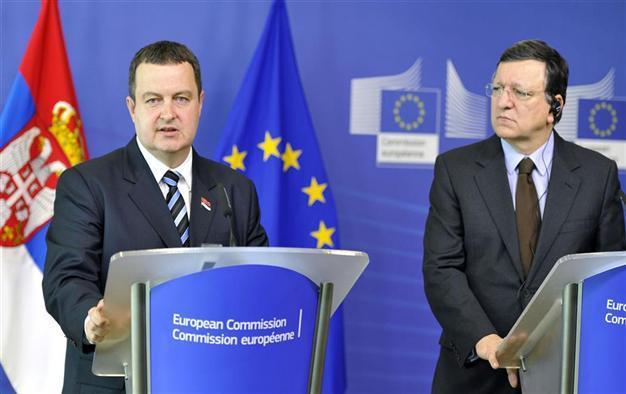EU greenlights Serbia membership talks, wraps up summit
BRUSSELS - Agence France-Presse

Serbia's Prime Minister Ivica Dacic (L) talks on June 26, 2013 during a joint press conference with European Commission President Jose Manuel Barroso following their working session at the EU Headquarters in Brussels. EU leaders wrapped up a packed two-day summit Friday giving a greenlight to the opening of accession talks with Serbia as the bloc continued to expand east. AFP PHOTO / GEORGES GOBET
EU leaders wrapped up a packed two-day summit Friday giving a greenlight to the opening of accession talks with Serbia as the bloc continued to expand east.
In what European president Herman Van Rompuy described as a "productive" two days, heads of state and government of the 27 countries that make up the European Union agreed to open accession talks with Serbia "by January at the latest." At the same time, they adopted a mandate to start talks on a Stabilisation and Association Agreement with Kosovo.
EU leaders also congratulated member state Latvia on its upcoming adoption of the euro at the start of next year and welcomed Croatia accession as 28th member on July 1. On the first day of the meeting on Thursday, the summit had rubber-stamped 8.0 billion euros ($10.4 billion) in a drive to bring down crippingly high unemployment among the continent's youths.
Furthermore, the leaders managed to stop Britain from throwing a spanner in the works to a deal on the bloc's next seven-year trillion-euro budget.
At a post-summit news conference, EU Commission President Jose Manuel Barroso described the two days as a "good summit for Europe." The decisions made "will make a difference for our economies," Barroso said, insisting that the situation in Europe was "much better than a year ago." While the budget and unemployment were the focus of talks Thursday, the issue of EU enlargement dominated the debate on Friday.
In spite of Europe's long and debilitating crisis, eastern European states continue to bid to join the bloc of 500 million people. Croatia will officially join at midnight on Sunday, becoming the first new arrival to the club since Bulgaria and Romania in 2007, and only the second member after Slovenia of the former Yugoslavia since its bloody breakup in the 1990s.
European president Van Rompuy described Croatia's accession as "truly an historic moment ... for your government, for the citizens of your country" as well as "a milestone for the region as a whole."
"You've always been European," Van Rompuy said. "Your entrance now, just when your neighbours are taking courageous steps along the same path, after a recent history of war, reminds all of us around this table of Europe's fundamental purpose: living together in peace, living together in prosperity," Van Rompuy said.
Croatian Prime Minister Zoran Milanovic said his country's journey to EU membership had been a long one, "with a lot of scrutiny, a lot of checks and balances, a lot of chapters." But he vowed that Zagreb "will do anything and everything and beyond that to help and assist (...) our neighbours who are not members of the club yet," in a reference to Serbia.
"We think that the process should start as soon as possible, last reasonably long but not too long, and have the whole process wrapped up," Milanovic said.
Serbian premier Ivica Dacic has held out hopes of bringing his country into the EU fold within a quick four to five-year span.
The EU's Enlargement Commissioner Stefan Fuele has suggested the accession talks may even begin "as early as October." On Thursday, simmering doubts over a tentative deal on the EU's next trillion-euro budget caused the meeting to stretch into the early hours. Britain's Prime Minister David Cameron ruffled feathers by going into battle to protect the 3.1 billion sterling annual UK rebate won in 1984 by Margaret Thatcher.
"It's absolutely essential that we stick to the deal that we reached in February and that we protect the UK rebate," he said, referring to a February proposal on the budget.
Diplomats said Cameron's objection had delayed the opening of the talks and Schulz worried that the British premier's stand could derail a compromise reached on Thursday.
"I think Prime Minister Cameron is never happy when we discuss the European budget," Schulz said.
EU diplomats were more blunt, with one telling AFP on condition of anonymity that it was "scandalous that a European summit is once again taken hostage by Cameron".
